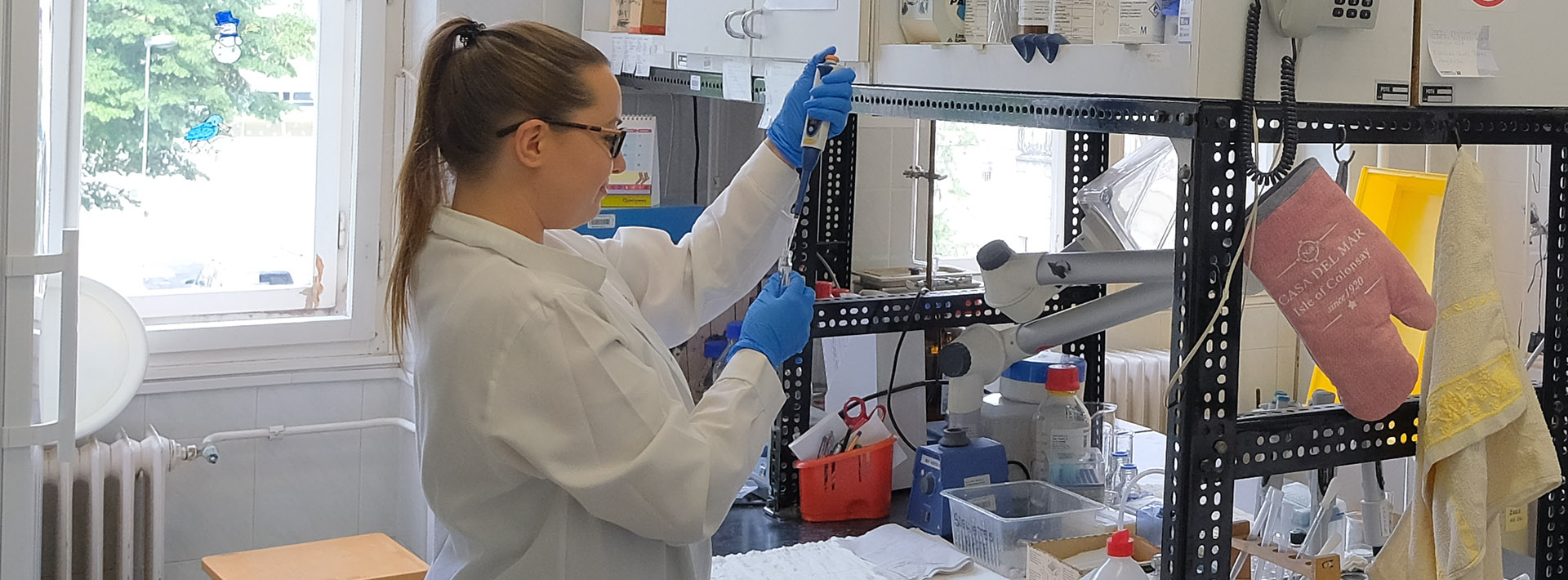Data
Official data in SubjectManager for the following academic year: 2020-2021
Course director
-
Dr. Lilla MAKSZIN
assistant professor,
Institute of Bioanalysis -
Number of hours/semester
lectures: 10 hours
practices: 12 hours
seminars: 0 hours
total of: 22 hours
Subject data
- Code of subject: OSF-CTD-T
- 2 kredit
- Dentistry
- Optional modul
- autumn
-
Course headcount limitations
min. 5 – max. 15
Available as Campus course for 15 fő számára. Campus-karok: ÁOK ETK GYTK TTK
Topic
Microchip capillary electrophoresis is an interesting approach for an increasing number of analytical problems in environmental applications and health science. The determination of size, quality and concentration of biomolecules such as DNA, RNA and proteins is one of the fundamental steps in life science research. Traditional methods for this type of analysis, such as gel electrophoresis or capillary electrophoresis, can now be complemented by an analytical technique, Lab-on-a-Chip technology. This technology enables downscaling and integration of several experimental steps (injection, labeling, dilution, separation, detection) into one process, in combination with automated data analysis. Lab-on-a-Chip technology has several advantages compared with conventional techniques, such as minimal sample requirement, rapid analysis times, ease-of-use, minimized exposure to hazardous materials and reduced waste generation.
The course deals with the theoretical background and application of the microfluidic methods, such as electrophoresis for detection of proteins, endotoxins, DNA, RNA and flow cytometry for detection of cells (bacteria, fungi, cancer cells, etc.).
Lectures
- 1. The principle and practice of capillary zone electrophoresis, theory of electrophoretic migration - Dr. Makszin Lilla
- 2. The principle and practice of gel electrophoresis, polyacrylamide gel electrophoresis (2-D PAGE, SDS-PAGE) methods - Dr. Makszin Lilla
- 3. The principle and practice of microchip electrophoresis - Dr. Makszin Lilla
- 4. The principle and practice of flow cytometry on microchip - Dr. Makszin Lilla
- 5. The structure and function of microchip electrophoresis device (Agilent Bioanalyzer 2100) (different types of detectors, injection methods) - Dr. Makszin Lilla
- 6. Preparation of microfluidic chips, properties and advantages - Dr. Makszin Lilla
- 7. Laboratory diagnostic applications of microfluidic chips 1. (electrophoretic separation of proteins, DNA, RNA) - Dr. Makszin Lilla
- 8. Laboratory diagnostic applications of microfluidic chips 2: (flow cytometry analysis of bacteria, fungi, cancer cells) - Dr. Makszin Lilla
- 9. Qualitative evaluation of „lab-on-a-chip” methods by help of Agilent 2100 Expert software - Dr. Makszin Lilla
- 10. Quantitative evaluation of „lab-on-a-chip” methods by help of Agilent 2100 Expert software - Dr. Makszin Lilla
Practices
- 1. Preparation of samples (serum proteins, bacterial proteins, endotoxins, etc.)
- 2. Preparation of samples; covalent labeling with fluorescent dye
- 3. Preparation of samples; denaturation
- 4. Microchip electrophoretic measurement, separation with Agilent 2100 Bioanalyzer
- 5. Qualitative analysis of samples
- 6. Quantitative analysis of samples, evaluation by help of 2100 Expert software
- 7. Preparation of cell samples (bacteria, fungi, HeLa cells, etc.)
- 8. Purification of cells
- 9. Preparation of samples; labeling with fluorescent dyes
- 10. Purification of labeled cells
- 11. Microfluidic measurement, cell counting and evaluation with Agilent 2100 Bioanalyzer
- 12. Final evaluation, mark
Seminars
Reading material
Obligatory literature
Literature developed by the Department
It is going to be available on the website and in Neptun.
Notes
Recommended literature
Instrumental analysis lecture and practise; microchip electrophoresis
Ann Van Schepdael: Microchip Capillary Electrophoresis Protocols, Springer, 2015
G2938-90062 Agilent Protein 80 Reagent Kit GuideUser Manual 9/19/2006
G2938-90310 Agilent (2008) Agilent High Sensitivity Protein 250 Kit Guide
G2946-90004 Agilent 2100 Bioanalyzer 2100 Expert User's Guide User Manual 6/21/2005
Conditions for acceptance of the semester
Maximum of 15 % absence allowed
Mid-term exams
During the semester students have to accomplish the preparative works. They have to document the experiments in their laboratory notebook.
Making up for missed classes
By personal consultation.
Exam topics/questions
The required information for the report will be explained in the course.
Examiners
Instructor / tutor of practices and seminars
- Dr. Makszin Lilla
